The 10 Worst Drinks for Weight Loss, According to Dietitians
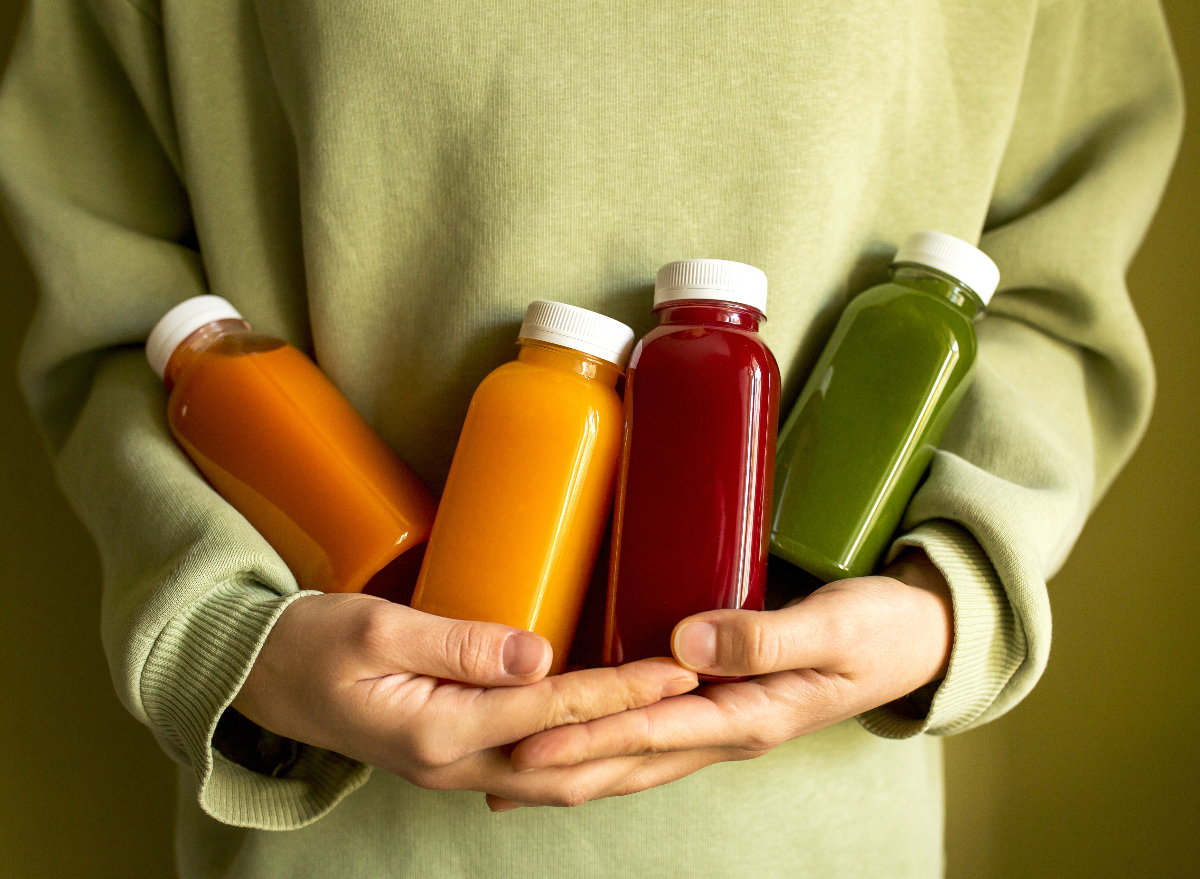
When it comes to shedding pounds, everyone talks about what foods to add or subtract from your diet. But what you drink can be just as impactful as what you eat for weight loss. Here, we spoke with registered dietitians who spill the beans on which drinks you should stay clear of if you're trying to lose weight.
Beverages can be sneaky culprits behind weight gain because they often contain empty calories from added sugars and lack the satiety that comes from consuming whole, nutrient-dense foods. Unlike solid foods, liquid calories may not trigger the same feeling of fullness, leading to an increased overall calorie intake throughout the day. Additionally, sugary beverages can cause spikes in blood sugar levels, prompting your body to store excess sugar as fat. Being mindful of the hidden calories in beverages is essential for those aiming to achieve sustainable weight loss, as even seemingly harmless drinks can add extra calories that lead to weight gain.
Whether you're looking to shed a few pounds or maintain the weight loss you've worked so hard to achieve, being mindful of your beverage choices is crucial for healthy weight management. Read on for the 10 worst drinks for weight loss, according to dietitians. Then, be sure to check out Here's How Much Green Tea You Should Drink Every Day To Lose Weight.
Fruit Juice
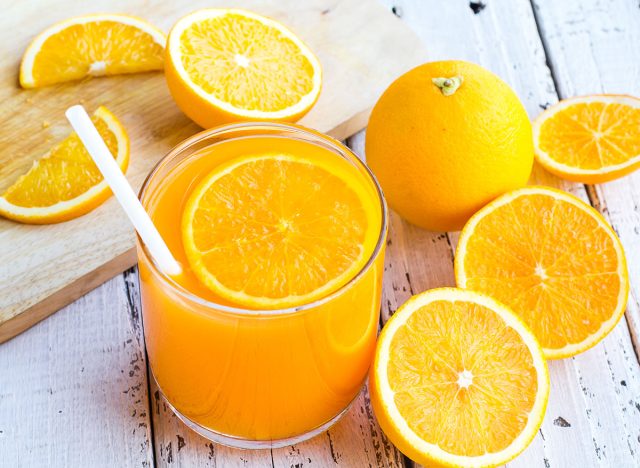
Despite their wholesome image, many fruit juices are loaded with added sugars that can thwart your weight loss journey. Dietitians caution against these seemingly healthy beverages due to the concentrated sugars that can spike blood sugar levels and lead to increased calorie intake.
Destini Moody, RDN, CSSD, LD, a registered dietitian and sports dietitian with Garage Gym Reviews, tells Eat This, Not That!, "Many people believe that fruit juice is a healthy beverage, even if made with 100 percent fruit. But while fruit juice contains more nutrients than a beverage like soda, it lacks the fiber of the whole fruit. This means the juice won't provide the feeling of fullness that eating fruit will, and it leads to you consuming calories more quickly."
Latte
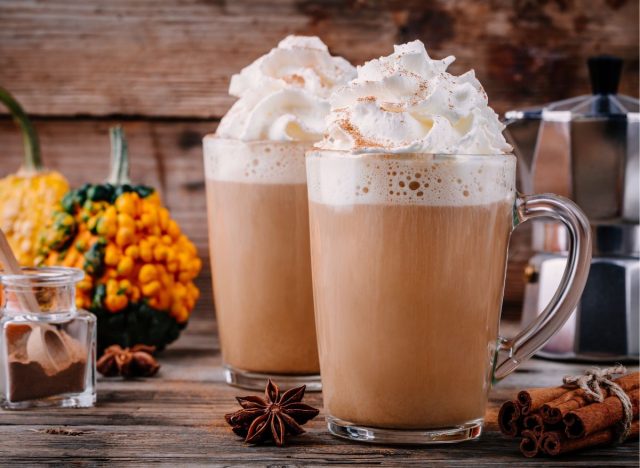
"Though black coffee can carry antioxidants and provide other benefits, coffee drinks like frappuccinos and lattes don't confer the same benefits," explains Moody. "Drinks like lattes can contain milk, cream, added sugars, and whipped cream. While having a daily cup of joe in the morning is fine for weight loss as black coffee contains little to no calories, a daily latte could make weight loss much more difficult." Next time you crave a rich, creamy latte, consider choosing a simpler black coffee option or an unsweetened alternative much lower in calories.
Alcoholic Beverages
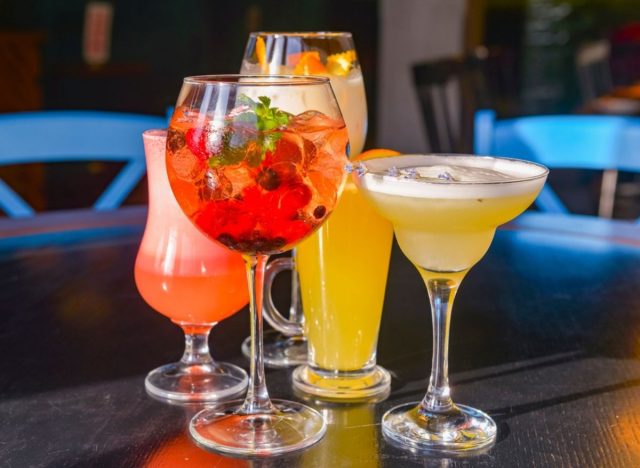
While a social drink may seem like a harmless way to unwind, alcoholic beverages are significant contributors to weight gain and can hinder weight loss efforts. That's because each gram of alcohol contains seven calories.
"Alcohol alone can have damaging effects on the metabolism in that activities like binge drinking can cause more fat storage and lower blood sugar to cause you to feel more hungry,' cautions Moody. "On top of these effects, alcohol like beer and cocktails can contain wheat, fruit juice, sodas, and syrups that can make the calorie content skyrocket."
Oat Milk
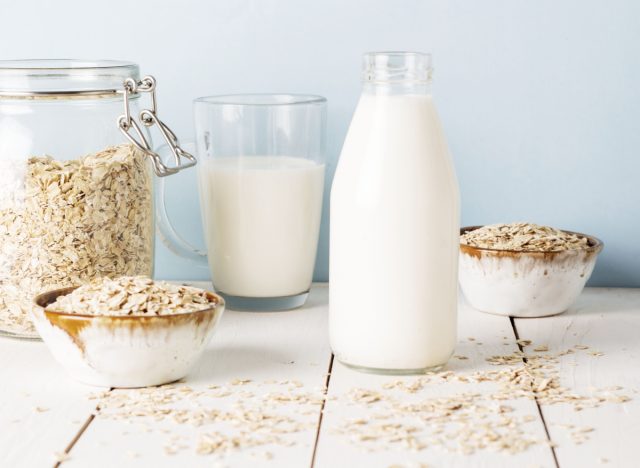
While oat milk offers a dairy-free option for vegans and those sensitive to lactose, its added sugars and calorie content may surprise you. "The problem with this plant-based milk is that, compared to other vegan substitutes like soy, it tends to lack protein but be high in carbohydrates," says Moody. "This can be dangerous for those seeking weight loss as protein makes you feel full and, without it, drinking a high-carb beverage so quickly causes blood sugar spikes and crashes. This means that oat milk can increase your calorie intake and appetite—a dangerous recipe for weight loss."
Energy Drinks
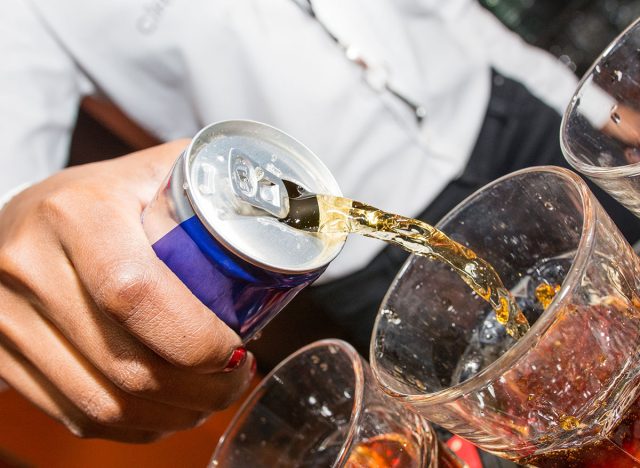
Despite their promise of a quick energy boost, energy drinks often contain added sugars and caffeine, which can indirectly affect weight management. Instead, choose natural energy sources like a balanced diet centered around whole foods and sleeping well.
"In the same vein as coffee, people may drink energy drinks daily or multiple drinks daily. However, these drinks typically contain added sugars or other caloric compounds to improve the flavor. So, if you're trying to lose weight, making a habit of having energy drinks isn't the best idea," says Moody.
Sugary Soda
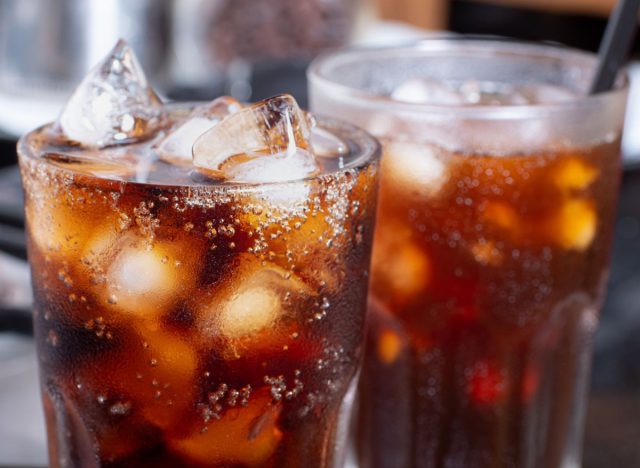
Loaded with sugars and devoid of nutritional value, these fizzy beverages deliver empty calories that can add up quickly. Dietitians recommend opting for water, herbal teas, or infused water for a refreshing, hydrating choice without the unnecessary sugars.
"From an energy balance standpoint, a diet soda is better for weight loss than full-calorie and full-sugar versions," says Gianna Masi, CPT, RDN, a certified personal trainer and registered dietitian with Barbend. "It's a common myth that drinking diet soda is worse for weight loss than regular soda. This is simply not true from an energy balance perspective. If you enjoy sodas, try a diet version as a starting point. This will greatly reduce the total amount of calories you're consuming."
Lemonade
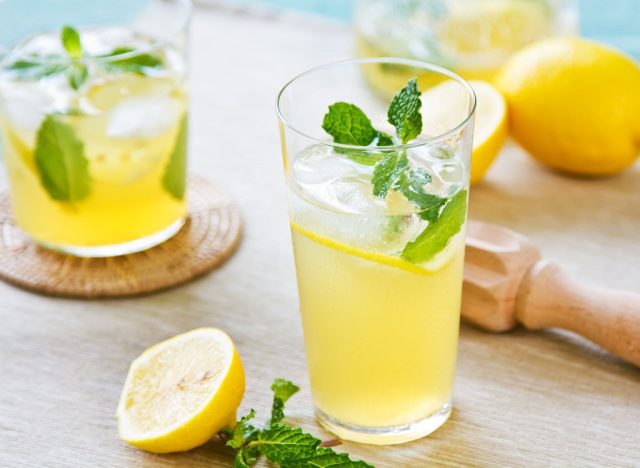
While the tartness of lemonade might seem innocent, its sugar content can pack a caloric punch. Choosing freshly squeezed lemon in water or a lightly sweetened version can be a more weight-friendly alternative.
"Additional calories from added sugars consumed through drinking beverages is not a helpful strategy for weight management," states Masi. "Consuming minimal calories through beverage sources is a strategy many can apply."
Fruit Smoothies Without Protein
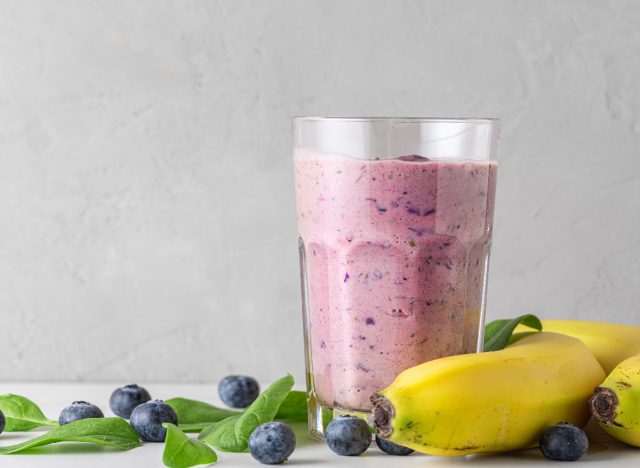
Smoothies, often perceived as healthy, can turn into sugar bombs when lacking protein. Protein is the most satiating macronutrient that can help support weight management. Give your fruit smoothies a protein boost by adding Greek yogurt or protein powder to make them more weight-loss-friendly.
"While fruit smoothies can be healthy, they can also leave people unsatisfied. With a goal of weight loss, it's best to consume fruit smoothies with a protein addition or a serving of fats to ensure you feel more satiated. The protein helps you to feel full and helps your lean muscle mass, which is a win-win for weight loss goals," says Masi.
Sports Drinks
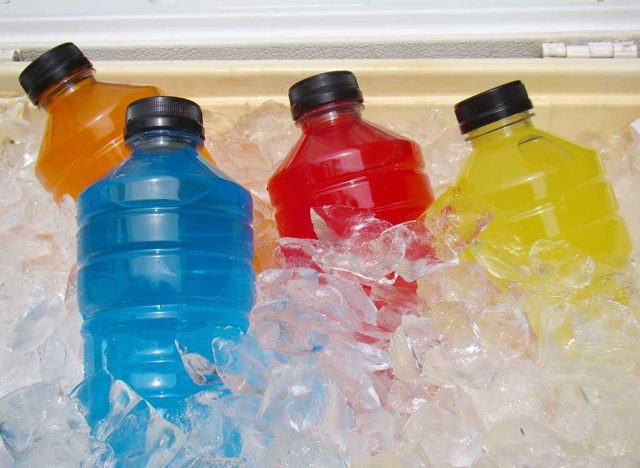
Marketed for boosting hydration during intense physical activity, sports drinks aren't all they're cracked up to be. They often have a high sugar content and are void of nutrition, causing you to consume extra calories without nourishment. If you want to stay hydrated during exercise, your safest bet is good old H2O.
"For most people, we don't need a sports drink to hydrate adequately," says Masi. "Sports drinks will provide additional calories and sugar, which is good for athletes or people who need to replenish their glycogen stores while working out. Those with a weight loss goal will want to drink plain water or opt for an unsweetened or sugar-free version if they want to consume a sports drink."
Trending Drinks with Olive Oil
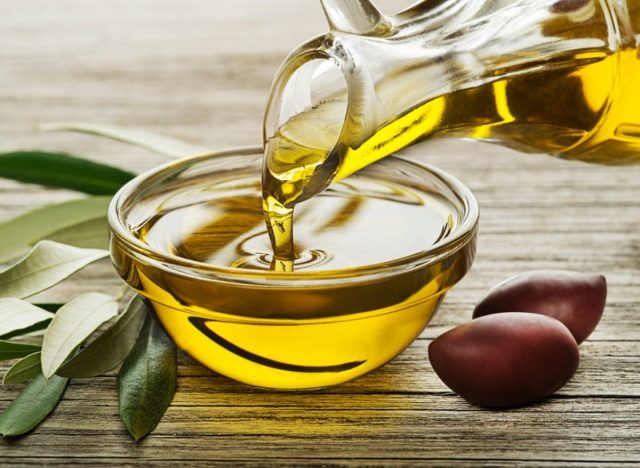
While olive oil has its place in a healthy diet, its incorporation into trendy drinks may not align with weight loss goals due to its high caloric density. Per the USDA, one tablespoon of olive oil provides 124 calories with little nutritional value.
"Any time you add additional energy and increase energy density to something easy to consume, especially by drinks, this will increase the total calories you're consuming," explains Masi. "Fats contain nine calories per gram, and when you add olive oil or high-fat items to a drinkable product, you're consuming a high amount of calories in a short period, which won't help with weight management. Instead, spread out fats throughout the day and avoid drinking extra unnecessary fats, like adding olive oil to a beverage."









